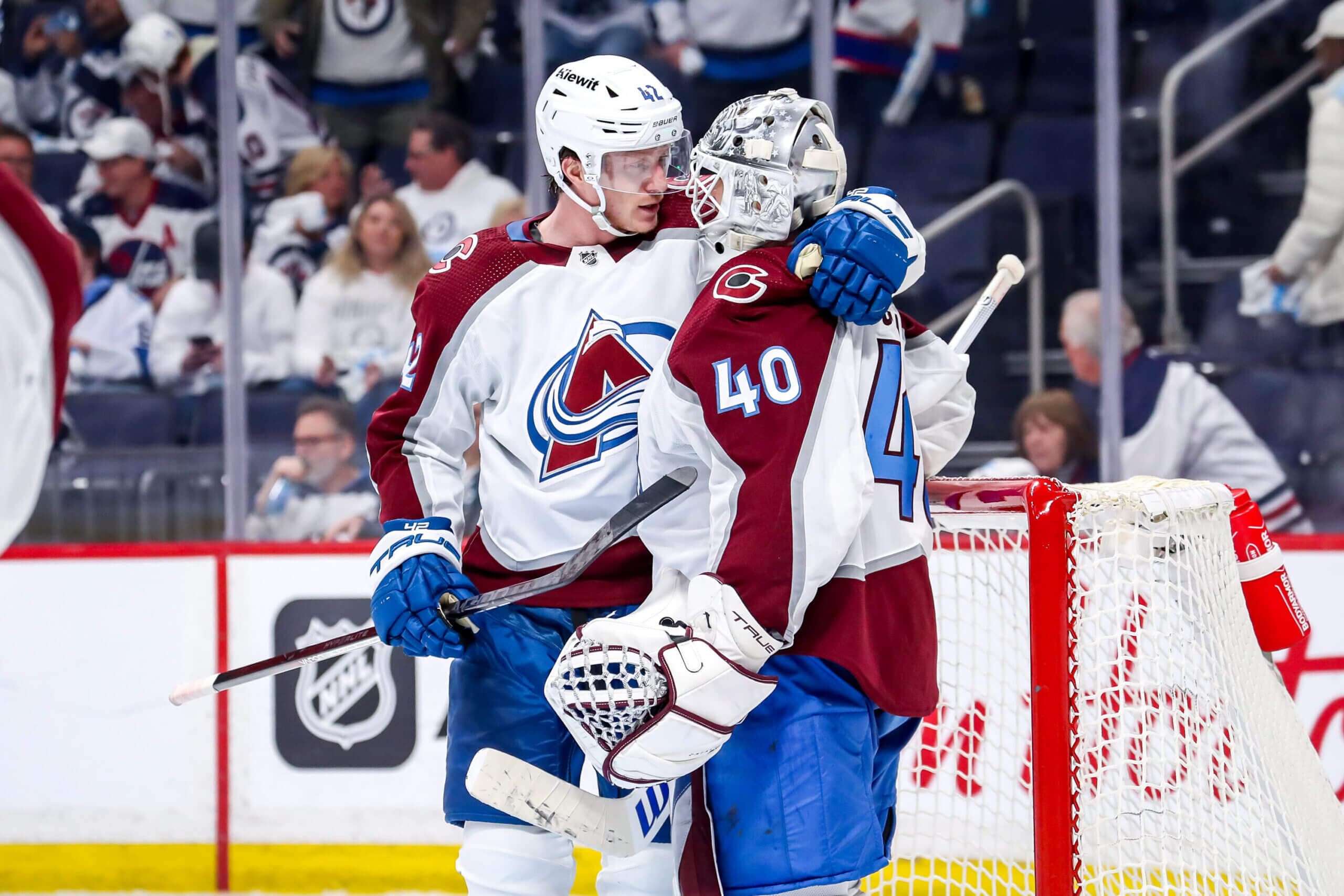Sports
Daniel, Henrik Sedin discuss NHL careers ahead of Hall of Fame inductions

|
|
He said he gave a speech to the Canucks before the 2000-01 season, the Sedins’ first in the NHL, in which he laid down team rules. One rule was that rookies were to be seen, not heard.
“So, I turned to these two,” Burke said. “I said, ‘I don’t want to hear a [gosh-darned] word from you two.’ They kept that promise for four years.”
Burke prodded them to speak Saturday.
Now the president of hockey operations for the Pittsburgh Penguins and a member of the Hockey Hall of Fame selection committee, Burke interviewed the Sedins at the PrimeTime Sports Management Conference in Toronto ahead of their Hockey Hall of Fame induction Monday.
The most interesting parts of the 25-minute conversation covered the early parts of their careers, before they won Olympic gold for Sweden in 2006, Henrik won the NHL scoring title and MVP award in 2009-10, and Daniel won the NHL scoring title in 2010-11.
Did you know the always calm, polite twins grew up next to a factory that manufactured tanks in Ornskoldsvik, Sweden?
“Peacekeeping tanks,” Daniel said with a smile.
Did you know they have two big brothers — Stefan, six years older, and Peter, four years older — who played hockey and soccer?
“It really pushed us to want to be able to play with them,” Henrik said. “I think that’s what made us push ourselves to become good.”
Did you know — or do you remember, maybe — they faced hard times their first few seasons in the NHL?
“Yeah, it wasn’t easy,” Daniel said. “Obviously high expectations being high draft picks.”
When they came to North America, the Sedins lacked strength. What they did have, though, was a soccer background and excellent cardiovascular conditioning. If they couldn’t outmuscle opponents, they’d try to outlast them.
“If we were in the offensive zone for more than 20 seconds, we knew the other team was going to be tired and we’d have our chance to score, and I think that’s how we survived as long as we did,” Henrik said. “Our conditioning was better than most people.”
What they also had was intelligence, not to mention an uncommon chemistry as twins. The face-off plays for which they became famous first arose out of necessity.
“I think that’s something we had to do early on,” Daniel said. “We weren’t physically strong enough to play with the big guys, and we had to come up with other things that we could use to our advantage. The face-off play was one.”
Henrik called Daniel “the face-off hero.” He said Daniel would come into the locker room during intermission and design “a strange face-off play.” They would go over it with their teammates and run it the following period.
“A lot of times we scored,” Henrik said. “It gave us a lot of extra goals.”
“It always ended with me scoring,” Daniel added with a smile.
The cycle plays for which the Sedins became famous mostly came later, after they spent the 2004-05 season in Sweden and returned to North America older and more physically developed.
“Cycling it down low was one that we always wanted to do, but early on, we couldn’t, because of our strength issue,” Daniel said. “I think that’s one thing after the lockout, when we came back stronger, we were able to do those things.”
Burke said he credited Marc Crawford, the Canucks coach from 1998-2006, for helping the Sedins through their early NHL seasons. The twins did too.
“I think Marc saw something in us and believed in us,” Daniel said. “He kept pushing us, and I think he educated us, what it meant to be professional.”
Henrik said Crawford taught them to play defense first.
“We didn’t produce maybe the way people expected us, but I think he taught us how to win games, and that’s with defense,” Henrik said. “From there on, we were able to start producing and be more complete players.”
Video: NHL stars reflect on Sedin Brothers HHOF induction
Losing the 2011 Stanley Cup Final to the Boston Bruins haunts the Sedins. The Canucks blew series leads of 2-0 and 3-2. They won each of their first three home games by one goal, but they lost three road games by a combined score of 17-3. Finally, they lost 4-0 in Game 7 at home.
“I wish we would have done something on the road that could have pushed us to win one of the road games,” Daniel said.
Henrik said the Canucks should have finished the series in Game 6.
“To not even have a chance on the road to steal a game, I think that’s what hurt us,” Henrik said. “Going into Game 7, it’s a toss-up. You fly there after the game. You come home. You see all the fans walking up the street, just expecting you to win. I won’t say it’s an advantage to play at home in Game 7, especially in a Canadian market.”
Henrik said each would trade his scoring title for a championship.
But here they are now, 23 years after they were drafted together, entering the Hockey Hall of Fame together. In Canucks history, Henrik ranks first in games played (1,330), assists (830) and points (1,070), and seventh in goals (240). Daniel ranks first in goals (393) and second in games played (1,306), assists (648) and points (1,041).
“This is truly special,” Burke said. “[It’s one thing] for any player going into the Hockey Hall of Fame, but to go in as identical twin brothers? Wow. Amazing.”
Sports
‘We didn’t really finish’: Canucks shoot often but poorly in Game 2 loss – Sportsnet.ca


* public_profileBlurb *
* public_name *
* public_gender *
* public_birthdate *
* public_emailAddress *
* public_address *
* public_phoneNumber *
Sports
NHL teams, take note: Alexandar Georgiev is proof that anything can happen in the playoffs – The Athletic


It’s hard to say when, exactly, Alexandar Georgiev truly began to win some hearts and change some minds on Tuesday night.
Maybe it was in the back half of the second period; that was when the Colorado Avalanche, for the first time in their first-round Stanley Cup playoff series against the Winnipeg Jets, actually managed to hold a lead for more than, oh, two minutes or thereabouts. Maybe it was when the Avs walked into the locker room up 4-2 with 20 minutes to play.
Maybe it was midway through the third, when a series of saves by the Avalanche’s beleaguered starting goaltender helped preserve their two-goal buffer. Maybe it was when the buzzer sounded after their 5-2 win. Maybe it didn’t happen until the Avs made it into their locker room at Canada Life Centre, tied 1-1 with the Jets and headed for Denver.
At some point, though, it should’ve happened. If you were watching, you should’ve realized that Colorado — after a 7-6 Game 1 loss that had us all talking not just about all those goals, but at least one of the guys who’d allowed them — had squared things up, thanks in part to … well, that same guy.
Georgiev, indeed, was the story of Game 2, stopping 28 of 30 shots, improving as the game progressed and providing a lesson on how quickly things can change in the playoffs — series to series, game to game, period to period, moment to moment. The narrative doesn’t always hold. Facts don’t always cooperate. Alexandar Georgiev, for one night and counting, was not a problem for the Colorado Avalanche. He was, in direct opposition to the way he played in Game 1, a solution. How could we view him as anything else?
He had a few big-moment saves, and most of them came midway through the third period with his team up 4-2. There he was with 12:44 remaining, stopping a puck that had awkwardly rolled off Nino Niederreiter’s stick; two missed posts by the Avs at the other end had helped spring Niederreiter for a breakaway. Game 1 Georgiev doesn’t make that save.
There he was, stopping Nikolaj Ehlers from the circle a few minutes later. There wasn’t an Avs defender within five feet, and there was nothing awkward about the puck Ehlers fired at his shoulder. Game 1 Georgiev gets scored on twice.
(That one might’ve been poetic justice. It was Ehlers who’d put the first puck of the night on Georgiev — a chip from center ice that he stopped, and that the crowd in Winnipeg greeted with the ol’ mock cheer. Whoops.)
By the end of it all, Georgiev had stared down Connor Hellebuyck and won, saving nearly 0.5 goals more than expected according to Natural Stat Trick, giving the Avalanche precisely what they needed and looking almost nothing like the guy we’d seen a couple days before. Conventional wisdom coming into this series was twofold: That the Avs have firepower, high-end talent and an overall edge — slight as it may be — on Winnipeg, and that Georgiev is shaky enough to nuke the whole thing.
That wasn’t without merit, either. Georgiev’s .897 save percentage in the regular season was six percentage points below the league average, and he hadn’t broken even in expected goals allowed (minus-0.21). He’d been even worse down the stretch, putting up an .856 save percentage in his final eight appearances, and worse still in Game 1, allowing seven goals on 23 shots and more than five goals more than expected. That’s not bad; that’s an oil spill. Writing him off would’ve been understandable. Writing off Jared Bednar for rolling him out there in Game 2 would’ve been understandable. Writing the Avs off — for all of Nathan MacKinnon and Cale Makar’s greatness — would’ve been understandable.
It just wouldn’t have been correct.
The fact that this all went down now, four days into a two-month ordeal, is a gift — because the postseason thus far has been short on surprises, almost as a rule. The Rangers and Oilers are overwhelming the Capitals and Kings. The Hurricanes are halfway done with the Islanders. The Canucks are struggling with the Predators. Panthers–Lightning is tight, but one team is clearly better than the other. Bruins–Maple Leafs is a close matchup featuring psychic baggage that we don’t have time to unpack. In Golden Knights–Stars, Mark Stone came back and scored a huge goal.
None of that should shock you. None of that should make you blink.
Georgiev being good enough for Colorado, though? After what we saw in Game 1? Strange, surprising and completely true. For now.
(Photo of Josh Manson congratulating Alexandar Georgiev following the Avs’ Game 2 win: Darcy Finley / NHLI via Getty Images)
Sports
Maple Leafs Game 3 Notebook: Scrutiny shifts to Marner, pressure to Bruins – Sportsnet.ca


* public_profileBlurb *
* public_name *
* public_gender *
* public_birthdate *
* public_emailAddress *
* public_address *
* public_phoneNumber *
-



 Health13 hours ago
Health13 hours agoRemnants of bird flu virus found in pasteurized milk, FDA says
-
Art18 hours ago
Mayor's youth advisory council seeks submissions for art gala – SooToday
-



 Health17 hours ago
Health17 hours agoBird flu virus found in grocery milk as officials say supply still safe
-
Media24 hours ago
Jon Stewart Slams the Media for Coverage of Trump Trial – The New York Times
-



 Investment17 hours ago
Investment17 hours agoTaxes should not wag the tail of the investment dog, but that’s what Trudeau wants
-
News17 hours ago
Peel police chief met Sri Lankan officer a court says ‘participated’ in torture – Global News
-



 Science21 hours ago
Science21 hours agoiN PHOTOS: Nature lovers celebrate flora, fauna for Earth Day in Kamloops, Okanagan | iNFOnews | Thompson-Okanagan's News Source – iNFOnews
-
Art18 hours ago
An exhibition with a cause: Montreal's 'Art by the Water' celebrates 15 years – CityNews Montreal






